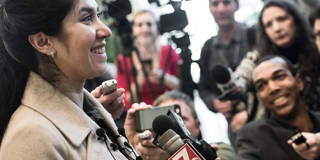Inventors from predominantly Muslim countries are vital to US innovation. President Donald Trump’s proposed travel ban, if enacted in whole or part, would do more than cheapen the American dream: it would weaken the country’s standing as the world’s capital of new ideas.
DUBAI – In his 1961 science fiction novel Stranger in a Strange Land, Robert A. Heinlein chose a Muslim linguist, “Dr. Mahmoud,” to help the book’s Martian-raised protagonist make the transition to life in the United States. Stranger may be fiction, but Heinlein’s selection of a Muslim interpreter was rooted in reality. In fact, people from the Middle East and North Africa (MENA) have been “translators” of innovation and discovery in the US for decades.
Recent research that I undertook, together with two colleagues at the Austrian Institute of Technology, Georg Zahradnik and Bernhard Dachs, relied on patent data filed in the US to shed light on the role that individuals of Arab, Kurdish, Persian, and Turkish ancestry play in the development of US technology. We began our research following US President Donald Trump’s executive order banning citizens from six predominantly Muslim countries from entering the US (the list originally included Iran, Iraq, Libya, Somalia, Sudan, Syria, and Yemen; Iraq was later removed).
What we found came as no surprise to us. But those charged with ensuring that the US remains the world’s leader in bringing new ideas to market should be worried.

DUBAI – In his 1961 science fiction novel Stranger in a Strange Land, Robert A. Heinlein chose a Muslim linguist, “Dr. Mahmoud,” to help the book’s Martian-raised protagonist make the transition to life in the United States. Stranger may be fiction, but Heinlein’s selection of a Muslim interpreter was rooted in reality. In fact, people from the Middle East and North Africa (MENA) have been “translators” of innovation and discovery in the US for decades.
Recent research that I undertook, together with two colleagues at the Austrian Institute of Technology, Georg Zahradnik and Bernhard Dachs, relied on patent data filed in the US to shed light on the role that individuals of Arab, Kurdish, Persian, and Turkish ancestry play in the development of US technology. We began our research following US President Donald Trump’s executive order banning citizens from six predominantly Muslim countries from entering the US (the list originally included Iran, Iraq, Libya, Somalia, Sudan, Syria, and Yemen; Iraq was later removed).
What we found came as no surprise to us. But those charged with ensuring that the US remains the world’s leader in bringing new ideas to market should be worried.